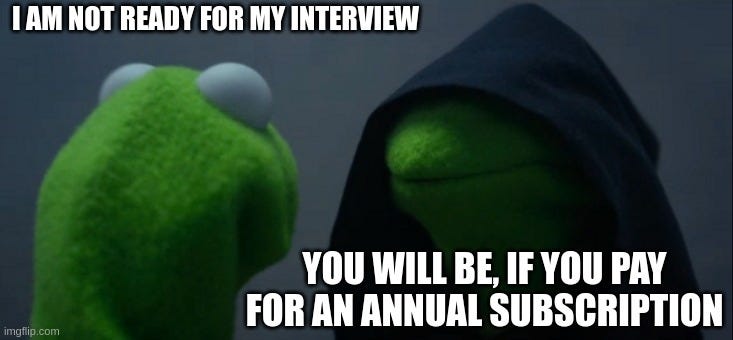The Weekly Wednesday: How to Persuade Without Credentials + Your Q&A Roundup
Interview Prep Goes Double Secret Nuclear 11/13/2024
This is the free stuff, it’s good, but you want it all.
This week we have questions and techniques. Here is a technique everyone should know, The Accusation Audit.
An Accusation Audit is a communication strategy, often used in negotiation or persuasion, where you preemptively identify and acknowledge potential concerns, criticisms, or negative assumptions that the other party might have about you, your qualifications, or your position. The goal is to disarm objections, build trust, and demonstrate empathy by addressing those concerns openly and honestly before they are raised.
Key Features of an Accusation Audit:
Anticipation: Identify what the other party might be thinking or worried about.
Acknowledgment: State those concerns explicitly to show you understand their perspective.
Reframing: Turn the concerns into opportunities to showcase your strengths or provide reassurance.
Connection: Use the acknowledgment to build a stronger rapport and shift the conversation to problem-solving or collaboration.
Why It’s Effective:
It reduces defensiveness by addressing concerns upfront.
It builds credibility and demonstrates self-awareness.
It allows you to control the narrative by framing the concerns in a way that highlights your strengths.
Example:
Acknowledge the Employer's Concerns:
"I understand you might be concerned about my lack of formal IB training or certification. It’s true that I have not gone through the official IB workshops yet."
Free Questions
How do you encourage students to take initiative in exploring ethical issues and making reasoned decisions in their learning?
I guide students to analyze complex problems by integrating ethical perspectives, fostering their ability to think critically and act responsibly.Can you describe a time when students collaborated effectively to solve a challenging problem?
During a group project on sustainability, students worked together to develop actionable solutions, leveraging diverse viewpoints and demonstrating their ability to collaborate and listen.How do you foster a sense of respect for diverse perspectives in your classroom?
I create opportunities for students to share their cultural values and traditions, encouraging thoughtful discussions that build empathy and mutual respect.What strategies do you use to help students balance the intellectual, physical, and emotional aspects of their lives?
I integrate mindfulness practices, physical activities, and reflective discussions into lessons to support holistic well-being and help students recognize their interdependence with the world.Can you give an example of a lesson that helped students connect their learning to global significance?
In a geography unit, students researched and presented on the impact of climate change in different regions, exploring how local actions can influence global outcomes.
Below the paywall is a huge section for learning how to do the Accusation Audit to address the lack of IB training and to answer questions with Strategic Empathy. I read books to learn this stuff, so considered doing the annual subscription :).




